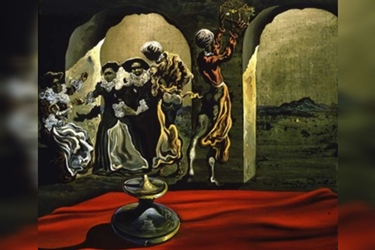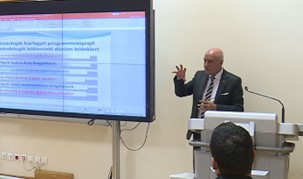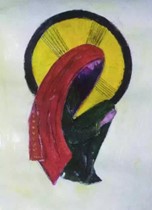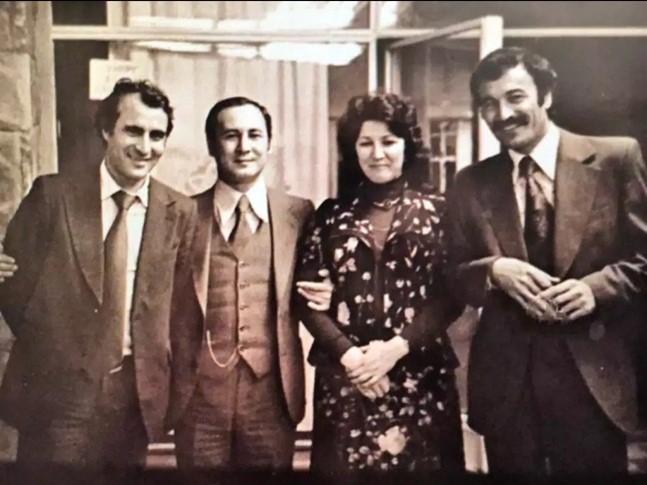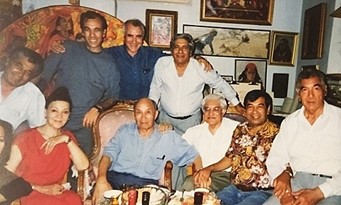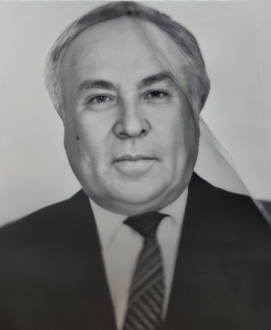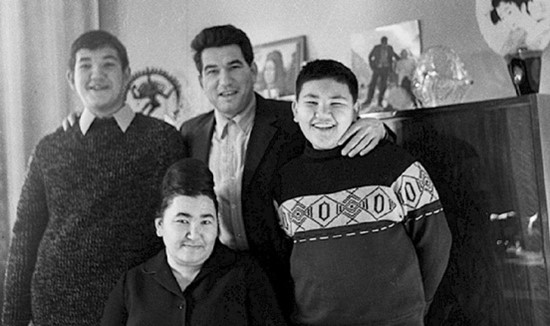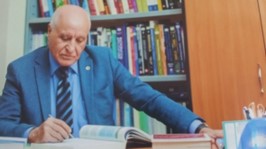Dr. Begench Karaev
The science of diplomacy: the monolith of the East and the binary of the West
“…The 21st century has brought into our lives not only high technologies, ultra-high-speed communications, fantastic innovations, but also many things that were unthinkable in the 20th century. In particular, before our eyes there is a transformation taking place in the socio-psychological sphere, which is increasingly and clearly acquiring a complete systemic character. This conclusion is easily illustrated by the example of massively changing intergenerational connections. Young grandchildren teach their grandparents the basics of computer literacy, or rather, skills in handling complex equipment… Minor children help parents master regularly updated and improved types of gadgets… Schoolchildren, including elementary school students, share with the teacher useful information gleaned from the Internet. These pictures of our reality become signs of the times around the world …”
The above lines are taken from a voluminous article published last fall on the pages of the central press of Turkmenistan, authored by Ovezdurdy Mukhammetberdiev, Doctor of Sociological Sciences, Professor at the Institute of International Relations of the Ministry of Foreign Affairs of Turkmenistan. Mukhammetberdiev is a man of encyclopedic knowledge, superior intelligence, and gifted by nature itself with the talent of a magnificent artist.
Ovez Berdievich , as we refer to him, is a typical representative of the intellectuals of the East who started with the basics of mathematics and other exact sciences, then proceeded to philosophy and social research. As for the images of a rich imagination, which are not always amenable to rational explanation, they express them through the means of artistic creativity – music, poetry or colorful paintings. It should be added that it is sometimes difficult to determine the relationship between the eastern and western in Professor Muhammetberdiev himself. The refined manners of a European intellectual are relegated to the background when he begins to expound on philosophical and sociological issues of a purely Eastern society, and vice versa. The breadth of thoughts, comparisons and contrasts of geopolitical trends in the analysis of international processes are accompanied by accurate calculations of the unique trajectories of the historical development of the civilizations of the West and the East.
For completeness, let us clarify that Ovezdurdy Mukhammetberdiev by his basic higher education, is a mathematician, and he mastered the basics of fine arts from his school days. When, on the eve of the epic history of the Cuban Missile Crisis, in December 1962, the First Secretary of the CPSU Central Committee Nikita Khrushchev trashed the exhibition of avant-garde artists in the Moscow Manege, the young man in the Mary outback created his allegorical works, which were subsequently awarded prizes at major republican fine art competitions.
Intellectual sprouts that appeared during the years of the so-called “thaw”, thanks to the activities of creative youth called “sixties”, sprouted in the late 60s and early 70s of the last century. The youth of Turkmenistan, like the dried soil of the virgin lands “takyr”, absorbed the fertile moisture of poetic lines from the lips of such 30-40 year old young talents as Kerim Kurbannepesov, Gurbannazar Ezizov, Khalil Kuliev, Atamyrat Atabaev, Nobatkuli Rejepov and others. Then the time came for the blossoming of Alta’s cinematography talents Karliev, Baba Annanov, Artyk Dzhallyev and many others. Turkmen music triumphantly rose to the heights of world recognition thanks to the brilliant creations of Nury Halmamedov, Aman Agadzhikov, Chary Nurymov and others. On the stages of the Bolshoi Theater in Moscow and other stages of Europe, the classical splendor performed by Atageldy sounded Karyagdyev and other outstanding singers of Turkmenistan.
Ovezdurdy, who began his career as a rural school teacher, first as a responsible employee of the Mary regional and then the Central Committee of the youth organization, found the “sixties,” that is, representatives of the creative youth of the 60s, in the prime of their powers by the mid-70s. As the head of the department of propaganda and cultural work of the republican youth organization, he helped in every possible way to realize their potential and abilities, organized various events, made publications, performances, exhibitions, etc. Now it looks somewhat surprising that the department headed by Ovezdurdy Mukhametberdiev, in particular, the creative youth club “Ylham” (Inspiration), which operated at the department, then became a kind of corner where young poets, writers, singers, actors, artists gathered from time to time in order to present their new poems for discussion, stories, sketches, creative ideas and plans.
The seventies were called the times of “Soviet stagnation,” especially against the background of the stagnation of the second half of this notorious decade, at the end of which the Soviet Union was involved in the so-called “Afghan trap.” Even at that time, the young scientist began to think about the factors of the relationship between the “moral code of the builder of communism,” proclaimed by the XXII Congress of the CPSU, and the stable roots of the national self-awareness of the people. In this context, of particular interest was the study of processes among young people, where complex interweavings of socio-ideological and socio-political processes took place in the vastness of the former Union.
Thus, a professional mathematician became an applied sociologist, which led to his transition to work in the system of the Academy of Sciences of Turkmenistan. Subsequently, the scientific searches of the young scientist were crowned with high recognition when Ovezdurdy defended his doctoral dissertation at the Specialized Council of the Russian Academy of Public Administration in 1991 and was awarded the degree of Doctor of Sociological Sciences. By the way, 40-year-old Ovezdurdy Berdievich then became practically the first doctor in sociology not only in Turkmenistan, but also in Central Asia. Thus, he fulfilled the request of his elder brother, the famous Turkmen scientist, Doctor of Historical Sciences, Professor Kakajan Berdievich Mukhametberdiev. Kakajan aga always instructed Ovez to study well and grow up to be a scientist. It was also an epoch-making year when Turkmenistan declared its independent statehood.
Before this event, the scientist’s biography was marked by the defense of a dissertation in 1984 at the Specialized Council of the Institute of Sociological Research (then the USSR Academy of Sciences) for the degree of Candidate of Philosophical Sciences in the then very rare specialty “applied sociology”. His dissertation was devoted to a sociological analysis of the lifestyle of young workers and engineering workers in the context of their involvement in social and political activities. As is known, in those days, Soviet society was at the threshold of irreversible changes that followed with the announcement of the policy of glasnost, perestroika and acceleration in 1985. Many processes in society have confirmed the correctness of many of the conclusions made by the young scientist based on the results of his sociological and psychoanalytic research.
By birth, Ovez belongs to the so-called post-war generation of “baby boomers,” applied to people born between approximately 1946 and 1964. It is interesting that when Ovez was not yet five years old, not far from his village, in the ancient settlement of Merv, the then young writer Chingiz Aitmatov was part of the creative delegation, who on April 22, 1954 received an urgent telegram about the birth of his first-born son. Chingiz (Genghis) at that moment was examining the majestic mausoleum of Sultan Sanjar, the last emperor of the Great Seljuks. In these joyful moments, Chingiz Aitmatov’s answer was unequivocal: “Name my son Sanjar!” So, April 22 of this year is the 70th anniversary date for the famous journalist and writer Sanjar Chingizovich Aitmatov.
It is no coincidence, therefore, that in the extensive library of Professor Mukhametberdiev, a special place is occupied by the works of the great writer and diplomat Chingiz Aitmatov. In this regard, speaking about the 80s, Ovez Berdievich quotes from Ch. Aitmatov’s story “The Mother’s Field”: “ Half of life is spent in dreams, which is perhaps why life is so sweet. Perhaps that’s why it’s so expensive, because not everything, not everything you dream about comes true.” Now it is difficult to judge to whom these lines of the outstanding writer-philosopher of the 20th century were directed. If we focus on the year of publication of the story – 1963, then most likely this was an indirect allusion to the Program adopted by the XXII Congress of the CPSU, which provided that by 1980 communism would be built in the USSR.
Perhaps our respected professor, referring to the words of the literary hero Aitmatov, in his thoughts compared the transformation of Chinese and Soviet societies, that is, the reforms of Deng Xiaoping and Mikhail Gorbachev. As you know, after a decade of systemic transformations, China was already at the forefront of world economics and politics, and the Soviet Union had by that time collapsed and relatively quietly sunk into oblivion.
Speaking about the modern era, the respected professor, as it were, summarizes past history and peers into the future potential of an eastern-type society, in particular, using the example of the rapidly growing “five” of Central Asia.
It is noteworthy that over the past decade and a half, the young states of Central Asia have boldly declared themselves on the world stage. Of course, in this case, the professor primarily has in mind the foreign policy initiatives of Turkmenistan. There are many examples here — for instance, take into account a whole range of international initiatives at the UN level, international forums held, as well as the implementation of large economic, energy and transport and transit projects of continental and global significance.
The independent states of Central Asia are now not so much an object as a subject of geopolitical trends, showing unity and coordination interaction both in the main vector of development of the region and in processes on a broader scale.
The combination of national interests with the priorities of the regional and wider international community is evidenced by the words of the President of Turkmenistan Serdar Berdimuhamedov addressed to Turkmen diplomats: “The foreign policy and diplomacy of our neutral Fatherland, based on the principles of peace and trust, are aimed at creating a favorable environment in the international space for the implementation of long-term national programs. And here our diplomatic service faces great demands – to use effective tools of political diplomacy, international legal and trade and economic consultations at the interstate and intergovernmental level.”
According to Professor Mukhametberdiev, the advantageous side of the initiatives being put forward is, first of all, that they are supported by the presence of a strong political will of the heads of state. In addition, the implementation of the large energy, transport, transit and other projects on the initiative of Turkmenistan is the result of not only political will, but also, if you like, courage on the part of the National Leader of the Turkmen people. And this is not accidental, because the geopolitical and geo-economic advantages arising from the favorable geographical location of the country are very attractive to large centers of world politics, economics and finance. This requires real fortitude and foresight to consistently uphold and protect the national interests of your state and people. In this regard, for example, the diplomacy of Turkmenistan under the leadership of President Serdar Berdimuhamedov shows the ability to clearly defend national interests, while at the same time achieving a logical combination of interests expressed by key actors in world and regional politics.
At the same time, it should be noted that the neutrality of Turkmenistan and the corresponding foreign policy strategy of the country have been and remain among the decisive factors in ensuring stability and security in this difficult part of the planet.
In modern conditions of increasingly complex international situation, Professor Muhammetberdiev considers it not entirely correct to pose the question in the context of some borrowed “course” or “model” of development of the Central Asian states. He is firmly convinced that each country in the region has its own and initially chosen path of development. The states of Central Asia do not seek to copy someone else’s experience of formation and development, but, if necessary, they take only the best, innovative elements, consistent with national interests.
The inviolability and sometimes apparent conservatism of the East lies in the fact that its traditions, including diplomatic ones, are based on a monolithic foundation of thousands of years. They concentrate both rationality and pragmatism, which in turn are combined with the foundations of deep beliefs that have become axioms of national consciousness and character. In particular, respect for “elders”, that is, for elders in society, reverence for wisdom and learning, good neighborliness and hospitality, loyalty to one’s word and trust in what is sincerely said, and many other features of national character organically entered into the content of the negotiation strategy, diplomatic protocol and etiquette of the peoples and countries of our region.
The expression of “inclusivity”, characteristic of the West, is most characterized in the plane of the East by the concept of “synthetics”. Inclusivity a priori means the formation of something whole by including heterogeneous, sometimes mutually contradictory elements in it. Therefore, such a format is fraught with the possibility of inconsistency between the participants of the so-called “inclusive” leadership. In turn, the synthetics of the constituent elements contributes to the emergence of the so-called synergy effect, which means a resultant force exceeding the initial arithmetic sum of the energies of individual structures.
The head of China, Xi Jinping, in one of his interviews with foreign correspondents back in March 2013, stated that: “We are ready to borrow all the achievements in the development of human civilization, but at the same time we will never copy the development model of other countries.” This means that the Eastern mentality, using the Chinese example, does not divide the world into opposite “white” and “black”, but, on the contrary, regards them in unity as different states of the whole. This vision of the world contributes to first searching for a common basis that unites the parties, or humanity as a whole, and then only to distinguishing and concretizing the features.
In this regard, Professor Mukhammetberdiev emphasizes that: “Sociology is the science of the future, since its task is to understand, explain, predict. Its importance is increasing in the 21st century, because modern society is becoming an increasingly complex system. Our world is global and interconnected. We have witnessed many times how events that happen in one part of the world affect what happens in another.”
According to Ovezdurdy Berdievich, only science that has a holistic, integrative view of it can explain and understand the modern state and societies, their place and role in the global civilizational space. Sociology is precisely one of these, the methodology of which helps to understand and analyze various international processes and the labyrinths of modern diplomacy.
Today, a relatively new direction is intensively developing – the sociology of international relations, which contributes to the scientific support of foreign policy and diplomacy. This is very important, given the increasing relevance of studying the nature of the relationships between various active actors in international relations. Sociologists are carefully studying the processes associated with the emergence of new formats of interaction within the framework of parliamentary, cultural, youth, sports, scientific and other areas of diplomacy. Along with this, scientific tools for researching so-called “big data” are also developing, where many phenomena have to be studied on the basis of a single platform of generalizing properties or based on their universal characteristics.
As noted above, it is also very important for diplomatic dialogue to initially find common ground, and then move on to those issues on which a mutually agreed vision needs to be developed.
This largely lies in the solidity, or more precisely, the integrity of the foundations and traditions of Eastern diplomacy.
Now let’s return to the word “binary,” which is reflected in the title as the direct sound of the English word: “binary,” that is, “binary” or “dual.”
Of course, in our case, the concept of “binary” or “dual” has nothing to do with mathematics and digital technologies. It is closer in meaning to “dual” in the context of the research of the respected professor. More precisely, “dual” is a substantive or structural characteristic of the geopolitical West, which reflects the dialectic of unity and confrontation of opposites, mainly binary. It is no coincidence that the genius of Aristotle laid the foundations of classical logic, which is very categorical when it comes to finding out the truth. According to it, “true” is that which is not “false”, and “false”, in turn, cannot be “truth”.
The same logic contributed to the development of stereotypes “friend or foe”, “either-or”, “good-bad”, “civilized-uncivilized”, etc. In geopolitics, this approach has given rise to a kind of “black and white” vision of all the civilizations. In particular, the “culture” of the West rejected the “barbarism” of the nomadic civilization of the East, which became the basis of the motto of Alexander the Great, who intended to “civilize the barbarians.”
By the way, let’s say that history has not recorded a systemic confrontation between Parthia and China – on the contrary, there is plenty of evidence of mutually beneficial relations between the two empires. The dichotomy is observed in the “Rome-Parthia” equation, the participants of which were more at odds than cooperative.
Millennia later, Europe was still captivated by the internal contradictions, which from time to time spilled over into the Asian side of the Eurasian continent, involving the Russian and Ottoman empires in European affairs. The result of this was the Napoleonic wars at the beginning of the 19th century, two world wars in the 20th century, and many of the most serious problems of the modern world order. The consequences are partly those processes when, already in our days, Afghan, Iraqi, Libyan and many other societies and peoples of Asia and Africa fell under “democratic” experiments undertaken according to Western patterns.
Professor Mukhammetberdiev states: “Today it is obvious for politicians, political scientists and social scientists that the modern world in some regions has become hostage to the negative stereotypes of the past – mutual distrust, alienation, intransigence and even aggressiveness.” In this regard, he asks the question: “The logical question here seems to be: who or what will prevail – the potential of the future, which absorbs the ability of younger generations for universal cognition and analytical thinking, or – the heavy burden of stereotypes of the past with their predisposition to conflicts and empirical consciousness?”
The diplomacy of Turkmenistan demonstrates the ability to effectively find answers to the difficult challenges of our time. In addition, new directions emerge and come into effect based on the objectives of the country’s foreign policy priorities. An example of this is developed by the National Leader of the Turkmen people, Chairman of the Khalk Maslakhaty of Turkmenistan Gurbanguly Berdimuhamedov – fundamental principles and concepts of economic, energy, transport, water, environmental, sports, scientific, medical diplomacy of our state.
Representatives of the scientific and expert community, some of whom also work in the Institute of International Relations of the Ministry of Foreign Affairs of Turkmenistan strives to make their contribution in cooperation with foreign partners. Scientific research by the institute’s staff, as well as analytical calculations by the Center for Strategic Studies of the IMO of the Ministry of Foreign Affairs of Turkmenistan, prove the increased potential and effectiveness of the practical actions of Turkmen diplomacy at the present stage. First of all, they are aimed at fulfilling the high goals set by the Motherland to ensure national interests and promote Turkmenistan’s foreign policy initiatives in the international arena.
In this context, it should be noted that the preached philosophy of dialogue in Turkmenistan implies a universal approach and joint constructive consideration of pressing problems of our time. In particular, the initiative of the President of Turkmenistan Serdar Berdimuhamedov to develop a Global Security Strategy, put forward at the plenary meeting of the 78th session of the UN General Assembly in September 2023, is aimed at this. According to the head of Turkmenistan, such a Strategy should reflect the presence, along with traditional ones, of new risk factors that have emerged recently. The President of Turkmenistan emphasized that he considers it necessary to include in the Global Security Strategy a number of areas of UN activity, including preventive diplomacy as a tool for preventing and neutralizing conflicts, using the potential of neutrality for the peaceful, political and diplomatic settlement of disputes and contradictions and restoring a culture of trusting dialogue, based on the decisions of the UN General Assembly to declare 2021 the International Year of Peace and Trust and 2023 the “Year of Dialogue as a Guarantee of Peace.”
“Time has confirmed the relevance of these resolutions for the present moment,” said the President of Turkmenistan in his speech.
As we see, the traditions of Eastern diplomacy prefer dialogue instead of confrontation. This is the essence of the new philosophy of international relations – “Dialogue is a guarantee of peace”, which forms the core of Turkmenistan’s foreign policy and diplomacy.
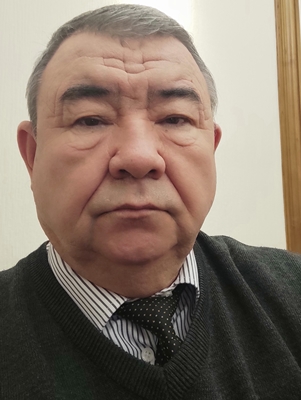
Dr. Begench Karaev deals with the problems of philosophy of law and politics. He is the author of a number of textbooks and monographs, including “Political analysis and strategic planning”, “Political analysis: problems of theory and methodology: (Experience in the study of modern Central Asian society)” and “Traditional and modern in the political life of Central Asian society (experience of political analysis)”.
///nCa, 7 February 2024
